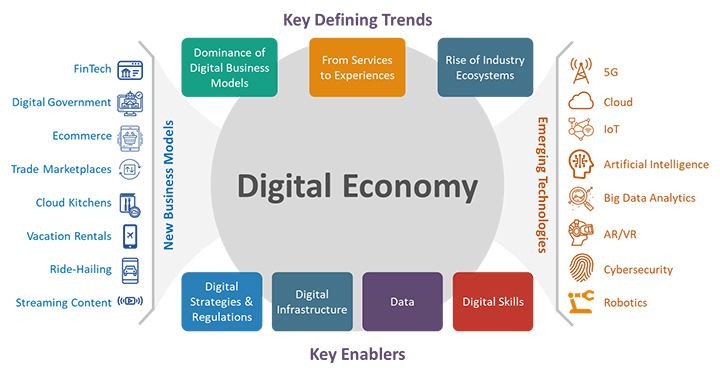Why offer business support services in an evolving digitized economy?
POST PANDEMIC
The pandemic has made the global digital economy flourish in many ways with increases in e-commerce activity, new business and service models, hybrid/remote work, and digital nomads. Digital technologies have become essential tools for communication and collaboration. Curaçao is no exception.
The impact was so significant that a trade development roadmap known as the “National Export Strategy” for Curaçao was developed and endorsed by the Caribbean island’s Council of Ministers on April 22, 2020. The National Export Strategy identifies technology, in particular digital solutions, as a way to strengthen and link all economic activity in Curaçao. But what is a digital economy, and why is it so important?
THE DIGITAL ECONOMY
Digital economy refers to the use of information technology to create or adapt, market, or consume goods and services. It is the convergence of communications, computing, and information. Digital products and services include online banking, e-commerce, virtual education, smartphone apps, and collaboration platforms.
The digital economy offers the potential for companies and consumers to connect more quickly, more efficiently, and more meaningfully to the products, services, and experiences they love. The digital economy can also contribute to the growth of GDP per capita by reducing the unemployment rate and improving the employment structure.
THE DIGITAL REVOLUTION
We are experiencing the digital revolution. The three pillars of the digital revolution include data, talent, and innovation. There are three overarching trends that help us better understand the new economic construct: Dominant Digital Business Models, the Shift from Providing Services to Creating Experiences, and the Rise of Industry Ecosystems.
Further, according to Nazir (2021), there are four key enablers of the Digital Economy namely:
- Digital Strategies and Regulations
- Digital Infrastructure
- Data
- Digital Skills

For a Digital economy to work, a business change is required called digital transformation.
Digital transformation is the process by which companies embed technologies across their businesses to drive fundamental change that could bring the following benefits: Increased efficiency, greater business agility, and, ultimately, the unlocking of new value for employees, customers, and shareholders.
The five known main domains of digital transformation are:
- Business Model Transformation
- Process Automation, Optimization
- Digital Product and Service Innovation
- Employee Empowerment and Engagement
- Customer Experience.
It may sound overwhelming. The domains can be difficult for large companies to execute but SMEs may have an advantage because of their smaller scale.
SMEs AND NEW TECHNOLOGIES
SMEs are well-placed to navigate these changing dynamics. They have strengths and advantages that can help them successfully compete in the digital economy, but they may not have the resources of the larger companies. Many SMEs are focused, responsive, and can often be found at the cutting edge of technology but do not have the financial strength to acquire, the more than often, expensive services and solutions to take advantage of the opportunities.
At the same time, it is important to test the workings of the new technology and facilitate open discussions about the pros and cons of its use in the long run. We’ve seen some instances where discussion about the challenges and shortcomings of new technologies is shut down because it is inconvenient to know the impact on people and the environment. It’s important to understand the More importantly, figure out which technology is the best for you. Just because it’s popular doesn’t mean you are obligated to acquire it.
We believe the following are key to ensuring success in the evolving digital economy:
- Be open and get prepared for change
- Innovate, Cooperate, and Collaborate
- Know your Customer Better
- Invest in developing digital skills, and
- Get the right technology
DIGITAL SKILLS AND CYBERSECURITY
When acquiring new technology make sure to foster the development of digital skills and the awareness of cybersecurity. More than often the last-mentioned is not taken seriously. Sometimes it comes across as a lecture where you glaze over technical terms. A more efficient approach would be showing real-life examples and planning test runs for people to experience it like it’s done with security alarm protocols in buildings.
Maybe similarly establish a cybersecurity protocol for people to know which preventive measures they can take themselves and who to contact when the situation escalates. In the cybersecurity world, all this is documented in the Enterprise Cyber Risk Management Framework which is part of the the cyber security strategy.
FINAL THOUGHTS
ARIDAN recognizes that it has become a challenging environment for entrepreneurs and businesses by offering support that will help you focus on the most important challenges and looking forward to helping like-minded businesses that don’t want to be the next Kodak but chose consciously to be the next Netflix. A company that adapts to the new environment to survive.
The road to digitization doesn’t have to be a lonely journey. There are many professionals ready to help you. Based on your needs, we can set you up with the appropriate professionals to provide you with the services you’ll need in the digitized world.
But first things first: get things into perspective and prioritize what you need first. We are here to help you!








